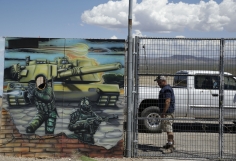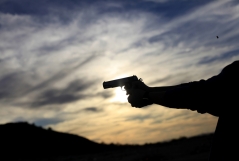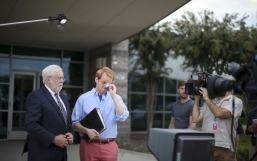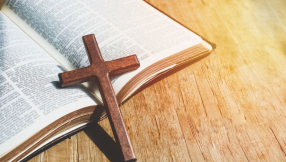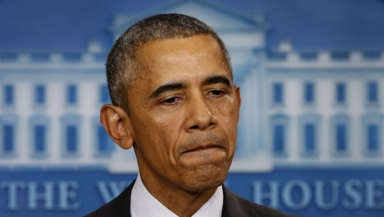
The look of resignation on the face of President Obama said it even more loudly than his words could. Here he was, once again, mourning the victims of a mass killing while bemoaning his inability to do anything about it. He is trapped in a system that won't allow him to legislate against the so-called spree killings. In his heartbroken frustration he articulated the feelings of millions of Americans and millions more of us who love America yet look on, horrified, from around the world.
Of course laws alone can't solve a problem like gun violence. But when the US has a higher level of gun deaths than anywhere else in the industrialised world, it would be bizarre to claim that gun laws have nothing to do with it. In 21<sup>st Century America, it's nigh-on impossible to regulate gun sales – and it's that which causes Obama's pessimism.
Why can't America find a more sensible regulatory system for firearms? Why must we accept that mass killings will happen with such regularity (astonishingly, this is the 294<sup>th mass shooting in America in 2015 alone)? Why must hundreds of families mourn innocent victims year after year?
The depth of the problem and the difficulty in tackling it was summed up well in the Washington Post in the aftermath of another mass shooting in Newtown, Connecticut. Charles Krauthammer wrote, "The reason is simple. Unless you are prepared to confiscate all existing firearms, disarm the citizenry and repeal the Second Amendment, it's almost impossible to craft a law that will be effective."
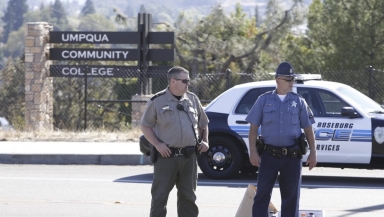
The basic truth is that the Second Amendment allows gun ownership. But that's only part of the answer. It's what lies behind the Second Amendment – an unswerving adherence to a rights-based discourse – that must take much of the blame. Simply put, in the liberal democratic tradition out of which the American Republic and Constitution were formed, the ultimate arbiter of what is good is the rights of an individual.
When one individual's claim to be allowed to behave in a certain way is disputed by another individual, the issue is 'resolved' by consulting the Constitution and case law to see whether the individual has a 'right' to behave as they have done. The Bill of Rights grants rights to individuals to ensure that the state doesn't accrue too much power – such as the right to trial by jury (Seventh Amendment) and the right to worship without coercion from the government (First Amendment).
This rights-based system is in the DNA of the American politics. Its advantages are obvious. Certain rights can't be taken away by arbitrary rulers, while ordinary people can appeal to the courts for protection against an over-mighty state. But its inherent flaws are also obvious – or certainly should be – and come into focus even more clearly in the aftermath of a brutal event like the Umpqua Community College shooting.
Because while the Second Amendment guarantees the "right to bear arms," the exercising of this right by millions of law-abiding Americans allows those intent on causing mass death and destruction a much freer ride than they would otherwise have had. The blanket right to own a gun, simply put, means that many bad, angry, disturbed people will have easy access to guns. Advocates of gun rights simply say this is the price of doing business. In a country that values the freedom of the individual, the right to own a gun is non-negotiable.
It's often said that your right to swing your fists ends where my nose begins. In theory, this may work – as soon as I have used my right to swing my fist to violate your right not to be punched, then I fall foul of the law and must be punished. But here is the problem. The right for a respectable, law-abiding American to own a gun allows a potential murderer to also own a gun. And when an innocent person's right to life is violated by that shooter, however much they are punished (usually by having their own life extinguished) the victim's right to life can never be restored.
This is the moral bankruptcy of a purely rights based-discourse. It is utterly powerless to guarantee the rights of innocent people against those who abuse their freedom. It presumes that people will keep the rules and that if we are set free to behave as we like, we will behave well. It simply can't account for the fact that when given the right to bear arms, a small number of people will so radically abuse that right, that it threatens the most sacred right of all – our right not to be killed.

One commentator suggests that the current inability of the US to prevent violent gun deaths has been hard-wired into the country. "In constitutionalising a guarantee of liberty, the Founding Fathers conceived a Frankenstein's monster. Gestating since 1791, the monster now seems an indomitable challenge to the very society that created it..."
Thomas Paine, one of the strongest advocates of individual rights, wrote the following: "Arms, like laws, discourage and keep the invader and plunderer in awe, and preserve order in the world as property. The same balance would be preserved were all the world destitute of arms, for all would be alike; but since some will not, others dare not lay them aside ... Horrid mischief would ensue were the law-abiding deprived of the use of them."
Paine's great adversary, the conservative philosopher Edmund Burke, understood the folly of what Paine was proposing. He said, "But as the liberties and the restrictions vary with times and circumstances... they cannot be settled upon any abstract rule; and nothing is so foolish as to discuss them upon that principle." In other words clinging to a permanent right, regardless of its consequences for others, is crazy.
Burke said that government, "requires a deep knowledge of human nature and human necessities... The science of constructing a commonwealth, or renovating it, or reforming it, is, like every other experimental science, not to be taught a priori... the real effects of moral causes are not always immediate."
A purely rights-based analysis is simply incapable of dealing with an utter tragedy like Oregon. The National Rifle Association, politicians of all sides and media commentators will say that although this is a horrific event, that the right to have a gun is unassailable. This just isn't good enough.
Leading contemporary philosopher John Gray sums up the moral vacuum at the heart of rights-based claims when he says, "The United States, where rights discourse is already the only public discourse that retains any legitimacy [has seen] the emptying of political life of substantive argument and the political corruption of law." Gray has also bemoaned the "Ruinous inflation of the rhetoric of rights, whereby every moral and political dispute and debate is cast in the legalistic idiom of rights discourse." This last phrase could sum up the expected response from gun-defenders – however many bad incidents there are – we have a RIGHT to our guns.
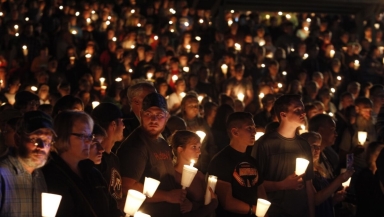
As Christians, can we ever fully defend a rights-based discourse? Lawyer and theologian David McIlroy thinks not. "The result of thinking of rights as 'things which belong to me' is that people come to see themselves as self-sufficient individuals... Instead of understanding our life's significance and meaning in terms of our relationships with others, we are encouraged to validate ourselves by asserting our independence from others."
So, what can be done? There is little appetite for doing as Krauthammer expresses and making the sweeping legal changes that would be necessary to reduce gun violence. Maybe the answer is an alternative discourse.
Instead of the emaciated view of competing rights, a Christian vision for society must be based on the Common Good. We should be striving for a society where school is a safe place to be, without the risk of being shot, while acknowledging that some people will need to own guns for hunting and farming.
David McIlroy goes on to give an expression of what this kind of discourse might look like, "The Judeo-Christian concept of the good is summed up in the idea of shalom. Shalom is a state of wholeness and harmony within a community which exists when all the relationships within that community are good. It is a good which is promoted by acts of justice and mercy, love and compassion. It is a good which is about each person being able to participate fully in the community, not a good in which each person is able to express themselves individually regardless of the cost to the community. Our social relations would be much healthier if we consciously sought to promote shalom, if we began with our responsibilities and recognised that others have rights to enable them to participate in community and because of our relations towards them."
This is the vision of a society in which we don't claim 'our rights' to the detriment of others. It may seem like a pipe dream and certainly, it's a long way off – especially considering the sheer number of guns in circulation in America. But it's the kind of society that many Americans strive for. And it's the kind of society under which we wouldn't wake up quite so often with that awful feeling in the pit of our stomachs after yet another group of innocent young people have had their right to life extinguished.










